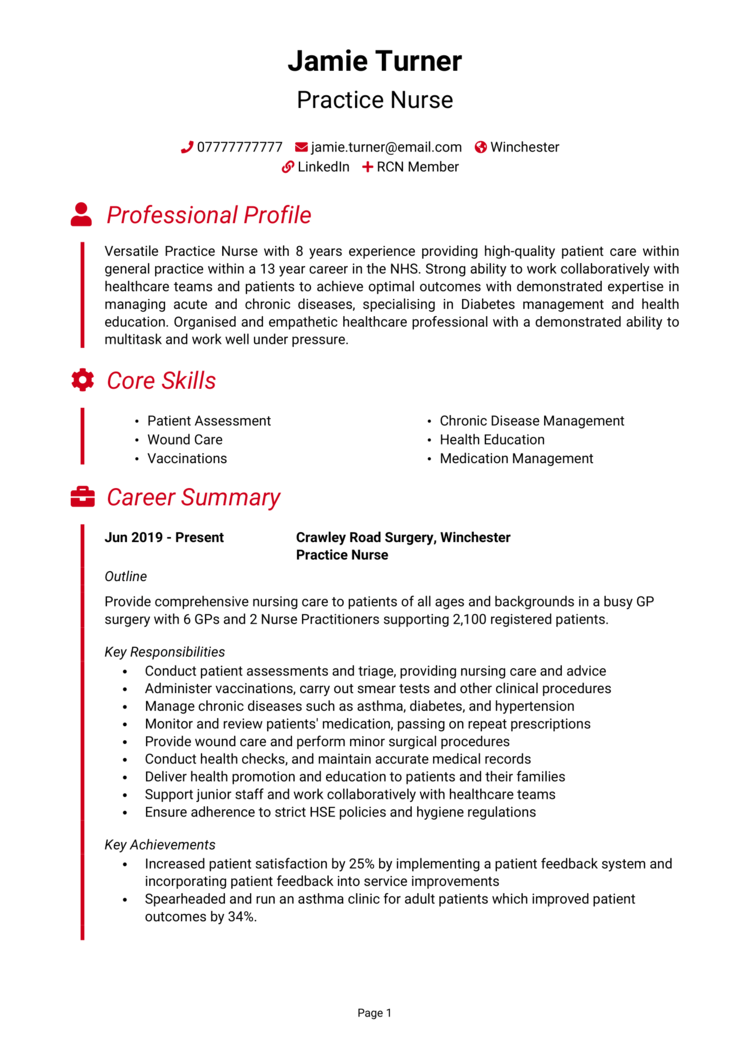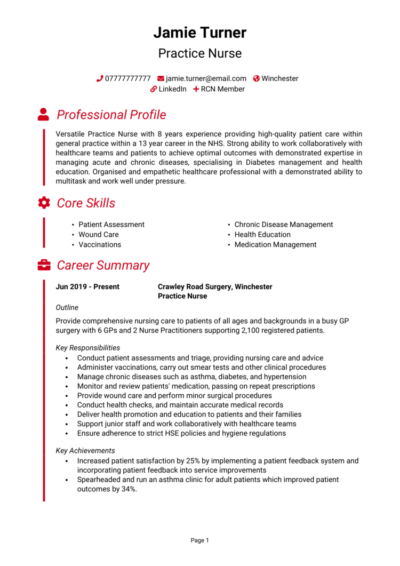Your role as a practice nurse can be a rewarding opportunity to help others and make a difference when it really matters.
But writing a quality CV which shows your clinical expertise and compassion is hard: this guide, with a Practice Nurse CV example, will show you how to do just that, helping you secure the roles you truly want.
Practice Nurse CV sample

How to write your Practice Nurse CV
Discover how to craft a winning Practice Nurse CV that lands interviews with this simple step-by-step guide.
This guide walks you through every step of writing a CV. From structuring your experience in a way that highlights your clinical strengths to showcasing your qualifications and areas of expertise, each section is designed to help you stand out.
Whether you’re applying to a GP surgery, community health clinic, or private practice, this guide will help you show why you’re the right nurse for the job.
How should you structure and format a Practice Nurse CV?


As a nurse, you know the importance of being thorough yet efficient – and your CV should reflect that same professionalism. A well-structured CV allows hiring managers to quickly find your qualifications and clinical competencies without wading through clutter. Even the best qualified candidates will be overlooked if they make the mistake of an untidy and disorganised structure.
Here’s the layout to follow:
- Name and contact details – Keep these personal details at the top so a potential employer can reach out to you.
- Profile – Immediately draw in the recruiter with a brief summary of your skills and experience.
- Core skills – Briefly highlight those qualities which make you the best candidate.
- Work experience – List your previous roles in reverse chronological order, with your most recent first.
- Education – Go through the academic history which underpins your expertise.
- Additional info – This optional section can include professional memberships, awards, or hobbies that showcase your suitability for the role.
Use clearly labelled section headings to break up your content, bullet points to present information efficiently, and keep your formatting clean with a professional, easy-to-read font. Stick to a two-page maximum length, and make sure every line serves a purpose – much like a well-kept patient record. Following these useful tips will ensure a coherent format which makes a good impression before a hiring manager even starts reading.
Writing a Practice Nurse CV profile


Your CV profile is the brief but crucial introduction that lets recruiters know who you are, what you do, and why you’re a perfect fit for their practice. It should sum up your background, specialisations, and the value you bring – all in a few sentences.
Avoid vague claims – focus instead on your clinical strengths, experience with specific patient groups, and areas of expertise like chronic disease management or health promotion. You need to convince the reader that you would bring genuine value.
Practice Nurse CV profile examples
Profile 1
Compassionate Practice Nurse with over 10 years of experience supporting general practice clinics across both rural and urban communities. Skilled in delivering chronic disease management, administering immunisations, and conducting health screenings. Committed to patient education and preventative care, with a strong record of supporting multidisciplinary teams.
Profile 2
Dedicated Practice Nurse with six years of experience working in NHS primary care settings. Experienced in cervical screening, wound management, and health promotion. Proficient in using EMIS Web for patient recordkeeping and focused on delivering safe, patient-centred care in line with best practice and NHS frameworks.
Profile 3
Reliable and adaptable Practice Nurse with five years of experience in GP surgeries and urgent care centres. Skilled in triage, travel health advice, and long-term condition reviews including asthma and diabetes. Known for clear communication, accurate documentation, and a proactive approach to continuous professional development.
Details to put in your Practice Nurse CV profile
Include the following:
- Where you worked – Mention whether you’ve worked in GP surgeries, community clinics, walk-in centres, or hospitals
- Your top qualifications – Include your NMC registration, nursing degree or diploma, and any additional certificates such as cervical screening or immunisations
- Essential skills – Highlight clinical skills like wound care, patient triage, chronic disease management, or administering vaccinations
- Patient groups – Specify if you’ve worked with children, elderly patients, those with complex needs, or mental health support
- Professional strengths – Whether it’s relationship-building, lone working, or adapting to a fast-paced environment, let your strengths show
Writing an effective core skills section


This section is your opportunity to list the core clinical and interpersonal skills that set you apart. Presented as bullet points, it gives recruiters an at-a-glance summary of your capabilities before they dive into your experience.
Tailor your CV skills to the job description – whether it’s general practice, travel immunisations, or preventative healthcare. Keep them practical and specific: avoid vague qualities like “dedicated” or “hard working” and focus on actual nursing competencies and specialisations.
The top skills to highlight in your Practice Nurse CV
- Clinical Assessment and Triage – Evaluating patient symptoms, conducting physical checks, and determining appropriate care pathways.
- Chronic Disease Management – Supporting patients with conditions like diabetes, asthma, and hypertension through monitoring and education.
- Vaccination and Immunisation – Administering routine and travel vaccinations in line with national guidelines and patient records.
- Wound Care and Dressings – Assessing and treating minor injuries, surgical wounds, and pressure ulcers using appropriate dressings.
- Cervical Screening (Smear Tests) – Carrying out cervical cytology procedures and ensuring accurate documentation and follow-up.
- Health Promotion and Education – Advising patients on lifestyle changes, smoking cessation, weight management, and preventive care.
- Phlebotomy and Sample Collection – Taking blood samples and preparing them for laboratory testing following clinical protocols.
- Infection Control and Clinical Hygiene – Following strict hygiene and sterilisation practices to prevent cross-contamination and infection.
- Electronic Health Records Management – Updating and maintaining accurate patient records using clinical IT systems.
- Multidisciplinary Team Collaboration – Working closely with GPs, healthcare assistants, and external services to provide holistic patient care.
Showcasing your work experience


Now it’s time to show what you’ve done and how you’ve made a difference. Your work experience section should detail your nursing duties, clinical responsibilities, and the impact you’ve had on patient care.
List your jobs in reverse chronological order and use bullet points to present your responsibilities and achievements clearly. Focus on your most recent roles, giving them the most detail, and streamline earlier jobs where necessary.
If you’re newly qualified, you can also mention clinical placements – just make sure you emphasise the skills you developed and the settings you worked in.
Writing job descriptions for past roles

- Outline – Briefly introduce the setting and your role: e.g. working in a busy GP practice, reporting to the lead nurse, providing care across a broad patient group.
- Responsibilities – List your core duties using power words like “administered” and “coordinated.” For example: “administered childhood immunisation programmes” or “coordinated chronic disease clinics for patients with diabetes and COPD.” Mention specific systems or protocols you followed.
- Achievements – Highlight results or successes, such as improving patient uptake of screening services, reducing wait times, or contributing to outstanding CQC ratings. Use figures where possible to back up your impact.
How to present past roles for Practice Nurses
Practice Nurse | Maybrook Medical Centre
Outline
Provided nursing services to a busy inner-city GP practice, supporting a patient population of over 9,000 and working closely with GPs and healthcare assistants.
Responsibilities
- Conducted routine appointments including blood pressure checks, phlebotomy, and ECGs
- Managed chronic disease clinics for patients with diabetes, asthma, and hypertension
- Administered immunisations including childhood vaccines and seasonal flu jabs
- Provided travel health consultations and vaccinations as per NHS guidance
- Maintained accurate records using EMIS Web and contributed to QOF targets
Achievements
- Increased cervical screening uptake by 18% through outreach and education initiatives
- Reduced wound care appointments by 25% through improved dressing protocols and patient advice
- Recognised in annual appraisal for consistently high patient satisfaction scores
Practice Nurse | Larkfield Surgery
Outline
Delivered general nursing services in a suburban practice, contributing to the delivery of preventative care and chronic disease management in collaboration with a multidisciplinary team.
Responsibilities
- Ran nurse-led clinics for long-term conditions such as COPD and cardiovascular disease
- Provided lifestyle advice, smoking cessation support, and weight management counselling
- Administered contraceptive injections and supported family planning services
- Took part in NHS health checks and new patient screening assessments
- Ensured compliance with infection control procedures and CQC standards
Achievements
- Played a key role in achieving a ‘Good’ rating in CQC inspection by updating clinical protocols
- Developed patient leaflets that improved understanding of inhaler technique and asthma control
- Reduced DNAs (Did Not Attend) by 20% through reminder system collaboration with admin team
Practice Nurse | Harford Green Health Partnership
Outline
Supported day-to-day nursing operations in a semi-rural GP practice, offering comprehensive primary care to patients of all ages in a community-focused setting.
Responsibilities
- Delivered vaccinations, wound care, cervical smears, and ear irrigation procedures
- Monitored and reviewed patients with long-term conditions in accordance with NICE guidance
- Educated patients on medication adherence, lifestyle changes, and symptom management
- Supported annual reviews for mental health and learning disability patients
- Used SystmOne to manage patient notes and coordinate care with wider health services
Achievements
- Helped reduce emergency appointments through improved chronic illness self-management
- Received recognition from the GP partners for high levels of professionalism and care
- Assisted in training new healthcare assistants in routine nursing procedures
Highlighting your education


This section should clearly show your academic background and nursing qualifications. Include your nursing degree or diploma, any post-registration training, and relevant CPD (Continuing Professional Development).
List your education in reverse chronological order, with the most recent first. If you’re early in your career, include more detail about modules, placements, and clinical areas covered during training.
The best qualifications to boost a Practice Nurse CV
- Registered Nurse (RN) with NMC Registration – The essential qualification that shows you’re licensed to practise nursing in the UK.
- BSc (Hons) Nursing (Adult) – A standard academic route into general practice nursing, covering essential clinical skills and theory.
- Cervical Screening (Smear Test) Training – Enables you to carry out cervical cytology as part of NHS screening services.
- Immunisation and Vaccination Certificate (UKHSA) – Required for administering vaccines in line with NHS protocols.
- Diabetes Management or Asthma/COPD Training (RCGP/NHS-endorsed) – Valuable for running specialist chronic condition clinics in GP practices.





